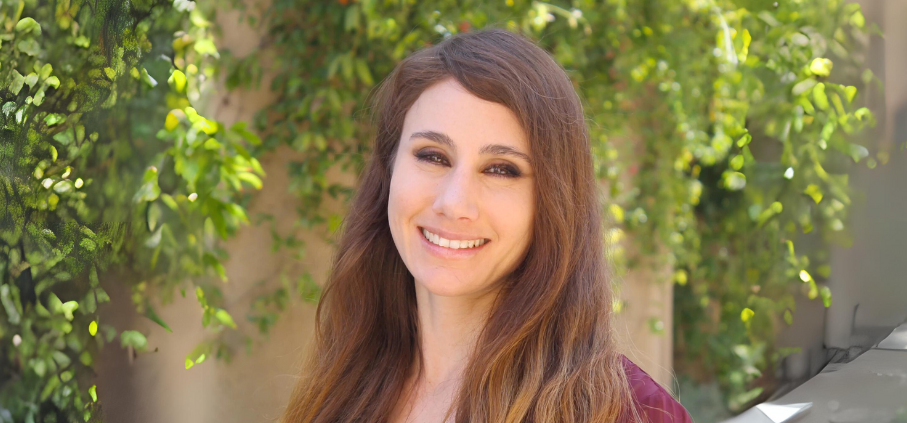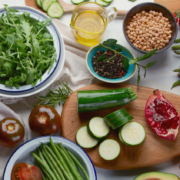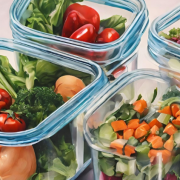Marily Oppezzo, PhD: The Heart and Soul of Stanford Lifestyle Medicine’s Head of Nutrition

This blog is part of our Supplements newsletter. If you like this content, sign up to receive our monthly newsletter!
“Sorry, Dad, I’ve fallen in love with Valerio and I’m not coming back,” said Marily Oppezzo, then 19, who spent the summer before her junior year of college studying art in Florence, Italy.
“Valerio? That’s absurd,” exclaimed Oppezzo’s father. “You are coming home and finishing college, young lady!”
Oppezzo followed her father’s wishes, kissed Valerio goodbye, and returned to Santa Clara University, where she jumped from one major to the next. Since the age of five, Oppezzo wanted to be a veterinarian, but then, in college, she pursued becoming an FBI agent, switched to art history while doing Pre-Med, and settled on majoring in Health Psychology with a double major in Italian (just in case).
After graduation, she continued her training by earning a master’s degree in nutritional science at San Jose State, working at the Veterans Affairs Hospital, and completing a three-year program to become a registered dietician nutritionist. In 2012, Oppezzo earned a PhD in Educational Psychology at Stanford University, with post-doctoral studies at the Stanford Prevention Research Center in Behavioral Sciences.
“Having health information is only half the battle,” said Oppezzo. “I also wanted to learn how to help people incorporate the information into their lives. If you don’t understand the psychology of building new habits, you’re just a walking textbook of information.”
Valerio’s loss was Stanford’s gain, as Oppezzo is now leading the Nutrition Pillar of Stanford Lifestyle Medicine and facilitating groundbreaking research in exercise and nutrition.
An Unexpected Emergency
During Oppezzo’s first year of doctoral studies, an astute nurse practitioner detected a heart murmur during a routine check-up. The following quarter, a Stanford cardiologist discovered several congenital abnormalities that caused her heart to pump most of her oxygenated blood from her lungs back to the wrong side of her heart. Just two weeks after the discovery, Oppezzo underwent open-heart surgery. Although she took only a quarter off from her studies, it took more than two years to recover fully.
“My cardiologist said I was lucky to still be alive at the age of 30,” said Oppezzo. “Now that I’m recovered, I deeply empathize with anyone who has to go through this. Cardiac rehabilitation was so painful.”
Her father was there for her during this arduous, multi-year rehabilitation process. He was a health education teacher and coached football, baseball, basketball, and track at Mountain View High School. He was an inspiration to many students and believed everyone had an inner athlete with the ability to overcome life’s obstacles.
“I owe my full recovery to my family–especially my dad,” said Oppezzo. “He was my support system and my coach through my physical therapy. It was slow progress, and I got frustrated really quickly–but he was so patient and positive the whole time.”
Turning Pain into Purpose
Returning to her doctoral studies at Stanford, she added heart disease prevention and cardiac rehabilitation to her docket of interests. Also, due to her experience of post-surgery depression, she began to study mind-body modalities, such as yoga and lifestyle medicine.
Oppezzo’s holistic–but realistic–approach to health is shown in her research. Her current study on “Exercise Snacks” encourages sedentary office workers to get out of their chairs a few times per day and perform a two-minute exercise (i.e., running up the stairs or jumping jacks at their desks) for both physical and mental health.
Research shows that it only takes two minutes of high-intensity exercise to reverse negative changes found in those who sit for more than three hours at a time. Another similar study showed that running for 10 minutes three times during the day conferred similar VO2 max benefits to running for 30 minutes continuously. In her research, Oppezzo also focused on behavior change and sought to understand how to motivate people to complete these exercise snacks during their work day.
“I like to find ways to support folks who are busy. We get it in our heads that we will go to the gym and do cardio and lift weights for hours; we have these huge goals. And then we get down on ourselves when we don’t do it, and think ‘why bother’ if I can’t do it all,” said Oppezzo. “But research shows that these two-minute exercises do still count—a lot! And the bonuses are that you don’t need a shower after, and you don’t need ‘enough time’ or resources to go to a gym.”
Future Goals
Oppezzo was recently awarded a two-year Clinician Scientist Fellowship at Stanford’s WuTsai Human Performance Alliance, where she will develop and test the “Stronger” program to help menopausal women start a muscle training practice to maintain and grow muscle mass. Oppezzo will also incorporate best behavioral science practices to empower women to start and maintain this as a lifelong “lifestyle” and improve both physical and psychological strength.
“I love working with the WuTsai and Stanford Lifestyle Medicine teams because it’s a chance for health professionals from various disciplines to come together and collaborate,” said Oppezzo. “In the future, I’d love to see more interdisciplinary collaboration in research to promote health in a more holistic way. We are more than our physical bodies—we need to look at the health of our minds and spirits, too.”
On a personal level, Oppezzo is very close with her family, which includes her mother, sister, and nephews, all of whom live in the Bay Area. Unfortunately, her father tragically passed away from a rare disease five years ago. “My dad meant so much to me,” she said. “He beat many odds, went out on his own terms, and lived and passed as a heroic example of someone who not only loved and cared for people deeply, he also embodied and practiced all the pillars of lifestyle medicine his whole life.”
When not working, lifting weights, or hanging out with her partner and rescue dog, Oppezzo loves to escape into the mountains for backpacking trips. “You can’t get closer to capital ‘L’ life than being in the mountains,” she said. “I cherish the enormity, awe, and blissful exhaustion I get to experience there. Hiking while being surrounded by nothing but huge peaks and glass-mirror lakes, I think about my dad and feel grateful for his inspiration and presence, which stay with me, always.”








